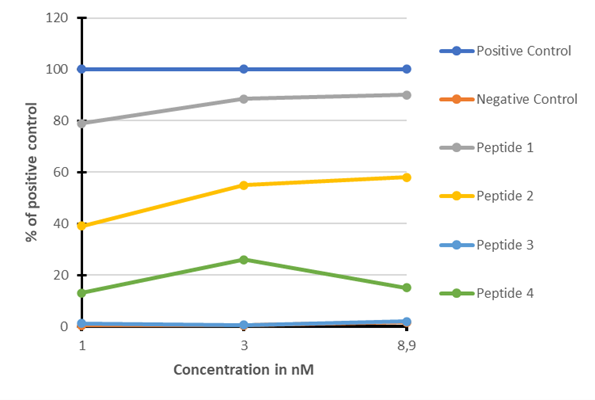pMHC Binding Screening
An essential step in assessing the immunogenicity of peptides binding to MHC
The Service
Accelerate your epitope discovery and validation by assessing the ability of your peptides to bind to MHC alleles.
At Immudex, we utilize high-quality MHC molecules to evaluate the potential of your chosen peptides and alleles to form stable peptide-MHC (pMHC) complexes.

Why Choose Immudex?
-
Over a decade of expertise: with more than ten years of expertise in producing pMHC complexes, Immudex provides valuable insights for binding evaluations
-
Superior quality control: rigorous quality control procedures ensure dependable and superior results
-
Transparent communication: we keep you informed every step of the way.
Assessing Peptide Binding to MHC I
To evaluate peptide binding to MHC I, we conduct small-scale refolding of your peptides with selected MHC alleles.
Assay Details
The assessment is carried out using a semi-quantitative bead-based assay, which:
- Measures: the amount of correctly folded pMHC complexes compared to a positive control peptide
- Detects: stable or unstable pMHC complexes
- Evaluation: peptide binding relative to a positive control peptide.

Efficiency of test peptide loading (1-4) onto MHC I monomers relative to a positive control. Values shown as % of the positive control, which is set to 100%.

Results
Peptides that form stable complexes produce strong bead-associated signals, while weak binders show low signals. These values provide guidelines for immunogenicity and are delivered to you in a detailed report.
The Report
Our detailed report includes:
- Summary of findings
- Background
- Method description
- Binding assessment
- Conclusion
- Next Steps
Additionally, you can discuss the results in a consultation with our Study Director.
 Download Example Report
Download Example Report
Assessing Peptide Binding to MHC II
Like MHC I, we perform small-scale peptide refolding with MHC II molecules to assess binding ability.
Assay Details
The assessment is carried out using a competition assay, where:
- Peptide Affinity: IC50 value is measured compared to a positive control peptide.
- Evaluation: Peptide is categorized as strong, weak or non-binder.
Accelerate Your Research
For more information or to start your pMHC binding screening, contact us today.
